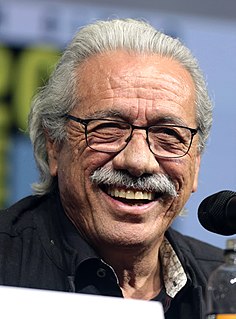A Quote by Edward James Olmos
There are nuclear weapons in China, Iran, Korea and Pakistan. It wouldn't take much to send a couple of warheads off on this planet somewhere that would cause a lot of environmental damage, then if you have got someone who wants to retaliate you have real problems.
Related Quotes
The real concern is that Iran would do what Pakistan did. Pakistan wanted nuclear weapons, like Iran, purely for defensive reasons - to defend itself against India. The problem was that once Pakistan acquired the weapons, it allowed the country to be more aggressive. So they stepped up their support for the Kashmiri terrorists, and it led very quickly to the Kargil crisis in 2000, which almost sparked a nuclear war between India and Pakistan.
Yes, I think lots of people are eager to obtain weapons of mass destruction. But there's no evidence that he has weapons of mass destruction. There's been no evidence of him testing nuclear weapons.
We have people that are in our face with nuclear weapons. We've got Iran and North Korea. We've got a problem with Pakistan. You know, I don't know what to say about that.
There's a whole lot of people that are going nuclear. And I think that Saddam Hussein is actually, with the evidence, the least able to use nuclear weapons and the least obvious offender in that area at this moment.
I think - I think the real nightmare place now is less Afghanistan than it is Pakistan. I mean, again, Pakistan is this gigantic country, deeply troubled, kind of almost ungovernable, sitting on top of probably 50 or 60 nuclear warheads. Nobody really knows where the warheads are; the Americans certainly don't know where they are.
I don't want to use the term "nuclear weapons" because those people in Iran who have authority say they are not building nuclear weapons. I make an appeal to the countries who do have nuclear weapons. They don't consider them a nuclear threat. But let's say a country that doesn't have nuclear weapons gets involved in building them, then they are told by those that already have nuclear weapons that they oppose [such a development]. Where is the justice in that?
Iran's goal is not to become another North Korea - a nuclear weapons possessor but a pariah in the international community - but rather Brazil or Japan, a technological powerhouse with the capacity to develop nuclear weapons if the political winds were to shift, while remaining a nonnuclear weapons state.
Iran's Supreme Court has issued a fatwa against the development of nuclear weapons. President [Hassan] Rouhani has indicated Iran will never develop nuclear weapons. I've made clear that we respect the right of the Iranian people to access peaceful nuclear energy in the context of Iran meeting its obligations.
Pakistan always seems to have a lot of political complexities and political challenges. But Pakistan is important for a number of reasons. Primarily, it is a nuclear power. And if, in fact, al Qaeda and Taliban, which are in Pakistan and causing a lot of tragedies and deaths in Pakistan - if they would ever somehow have real influence and control of that government, then we [world] really have a problem.
What is the only provocation that could bring about the use of nuclear weapons? Nuclear weapons. What is the priority target for nuclear weapons? Nuclear weapons. What is the only established defense against nuclear weapons? Nuclear weapons. How do we prevent the use of nuclear weapons? By threatening to use nuclear weapons. And we can't get rid of nuclear weapons, because of nuclear weapons. The intransigence, it seems, is a function of the weapons themselves.
We won't take any of the talks seriously if they don't do something to ban all nuclear weapons in North Korea. We consider this to be a very reckless regime. We don't think we need a Band-Aid, and we don't think we need to smile and take a picture. We think that we need to have the, stop nuclear weapons, and they need to stop it now. So, North Korea can talk with anyone they want, but the US. is not going to recognize it or acknowledge it, until they agree to ban the nuclear weapons that they have.
There's no question that Saddam Hussein is a threat Yes, he has chemical and biological weapons. He's had those for a long time. But the United States right now is on a very much different defensive posture than we were before September 11th of 2001 He is, as far as we know, actively pursuing nuclear capabilities, though he doesn't have nuclear warheads yet. If he were to acquire nuclear weapons, I think our friends in the region would face greatly increased risks as would we.
We've gotten a long way on missile defense. We know how to do it. We know how to take down incoming warheads, but we need to do a lot more work in order to be - to deploy a system that'll defend the United States against those kinds of limited strikes that might be possible by a nuclear armed North Korea or Iran.




































